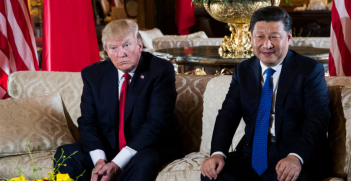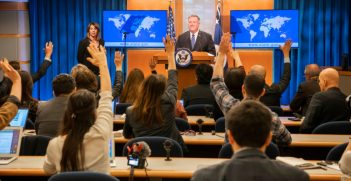Stuck in the Swamp: The Nunes Memo's Attack on the FBI

In Washington DC, explosive Republican accusations of politically motivated spying in the lead up to Donald Trump’s presidential election victory have drawn the intelligence services deeper into the growing partisan chasm.
The so-called Nunes memo, written by the Republican staff of House Intelligence Committee Chairman Rep. Devin Nunes to prove misconduct at the FBI, is a misleading document. With a focus on the Foreign Intelligence Surveillance Act (FISA) application process itself, it was a piecemeal exercise in cherry-picking classified information that remained heavily reliant on innuendo while full of significant omissions.
For example, such lapses include whether a controversial dossier by ex-British intelligence officer Christopher Steele was the overriding basis of the FISA court’s decision to grant a warrant to secretly monitor former Trump campaign official Carter Page. The warrant was obtained when Page was no longer part of the Trump campaign and had been renewed three times to allow continued surveillance.
Much of the Trump team’s hyperventilation is also due to that specific dossier being funded in part by the Democratic National Committee. Yet, the Trump-Russia investigation was not triggered by the Steele dossier; instead, it was initiated by information that the FBI obtained based on conversations by former adviser George Papadopoulos on a night out in London with then Australian High Commissioner Alexander Downer. The impression that the memo has vindicated President Trump is nonsense.
Overall, the Nunes memo contains no smoking gun to cripple Special Counsel Robert Mueller and provides no valid grounds to derail the ongoing investigation into potential links or coordination between the Russian government and individuals associated with the Trump campaign. Rather, it appears an amateurish sideshow for partisan gain. The underlying idea of a conspiracy-fuelled ‘deep state’ plot to undermine President Trump is a fashionable but baseless distraction. As House Speaker Paul Ryan concluded, “This is a completely separate matter from Bob Mueller’s investigation, and his investigation should be allowed to take its course.”
But the crux of the memo does act to serve a noteworthy and obvious political purpose: to confuse public perceptions and undermine the integrity and credibility of the Mueller Russia-Trump investigation. At the same time, it will certainly embolden those who have a pre-existing bias regarding anti-Trump hostility and the peculiar amplification that the Muller investigation entails “the single greatest witch hunt of a politician in American history!”
Discrediting the investigation?
At this stage, four people connected to the Trump campaign have been charged in the Mueller probe. This encompasses former National Security Advisor Michael Flynn, who has pleaded guilty to making false statements to the FBI over his contact with Russian Ambassador Sergey Kislyak during the transition. George Papadopoulos is another who has already pleaded guilty to making false statements to the FBI. Both individuals are cooperating with the ongoing Mueller investigation. However, Paul Manafort and Rick Gates have pleaded not guilty on numerous counts that contain serious charges such as money laundering.
Mueller is also examining whether Trump himself (or others) have tried to interfere with the ongoing investigation. Additionally, it is worth noting that the four-page memo did not contest the fact that Russia had hacked into the emails of the Democratic National Committee.
So there is far more to the Russia-Trump investigation than scattered points contained in the Nunes memo, Carter Page surveillance and alleged violations of his civil liberties. The nature and timing of criticism of Mueller’s probe is intriguing, with speculating mounting that his team is expanding investigations of the interactions between not only Trump’s inner circles but his immediate family members and their ties to the Kremlin.
Trump’s former chief strategist Steve Bannon has been quoted as saying:
You realise where this is going. This is all about money laundering. Mueller chose [senior prosecutor Andrew] Weissmann first and he is a money-laundering guy. Their path to … Trump goes right through Paul Manafort, Don Jr and Jared Kushner…It’s as plain as a hair on your face.
Despite a wide range of unanswered, vexing and unresolved questions, it does appear many die-hard Trump supporters are unlikely to change their mind about notions of FBI and Justice Department sabotage and abuse.
A broken intelligence cycle
Irrespective of the unavoidable and ongoing political sparring about the relevance and implications of claims within the Nunes memo, its release represents a highly dangerous political game and problematic security trend: the selective release and politicisation of classified information.
It has signified a notable revolution in the best practice route of intelligence oversight. Prior to its public release, Assistant Attorney General Stephen E. Boyd warned that that it would be “extraordinarily reckless” for the House Intelligence Committee to publicise a memo with classified material without first giving the Justice Department and the FBI “the opportunity to review the memorandum” and inform elected officials “of the risk of harm to national security and to ongoing investigations that could come from public release.”
Additionally, the Trump White House has been accused of trying to politicise intelligence in other contentious areas such as supporting its hardline approach to Iran; in short, directing staff to generate intelligence analysis to champion a preferred policy outcome.
Such a manipulation of the intelligence cycle—via direct or even indirect political pressure—is corrosive, serves to elevate emotive preoccupations or ideological pet projects over educated assessments and can led to highly counter-productive outcomes. It remains critical that intelligence should remain rigorously separate from the work of policy. Disturbingly, it appears shifts in the US political landscape are acting to undercut and destabilise the proper models for how intelligence should relate to policy.
Dr Daniel Baldino is a senior lecturer and discipline head of the Politics and International Relations program at the University of Notre Dame.
This article is published under a Creative Commons Licence and may be republished with attribution.





